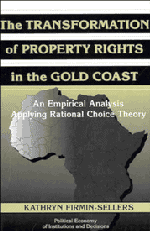 The Transformation of Property Rights in the Gold Coast
The Transformation of Property Rights in the Gold Coast Published online by Cambridge University Press: 08 January 2010
The Cambridge series on the Political Economy of Institutions and Decisions is built around attempts to answer two central questions: How do institutions evolve in response to individual incentives, strategies, and choices, and how do institutions affect the performance of political and economic systems? The scope of the series is comparative and historical rather than international or specifically American, and the focus is positive rather than normative.
In a work rich with insights from anthropology and neoclassical economics, Kathryn Firmin-Sellers exposes an important, ubiquitous dilemma facing developing countries in the transition from customary land tenure systems to potentially more productive private property rights systems. The dilemma is that this productive potential of a property rights system depends not only on how the rights are assigned but also on the degree to which the rights can be and are enforced. Private property rights will only inspire significant individual investment and/or economic growth if political institutions convey to the ruler of a community or nation sufficient coercive authority to silence any who advocate alternative, perhaps politically attractive, allocations of property rights. Nevertheless, once they are vested with such coercive authority, institutions must also create political incentives for rulers to establish a credible commitment to enforce those rights, rather than to use their coercive authority to implement distributionally more favorable systems of rights. However, in transitional societies the institutions themselves are “up for grabs, ” frequently being created by the same rulers for whom the institutions must establish the conditions for credible commitment.
To save this book to your Kindle, first ensure [email protected] is added to your Approved Personal Document E-mail List under your Personal Document Settings on the Manage Your Content and Devices page of your Amazon account. Then enter the ‘name’ part of your Kindle email address below. Find out more about saving to your Kindle.
Note you can select to save to either the @free.kindle.com or @kindle.com variations. ‘@free.kindle.com’ emails are free but can only be saved to your device when it is connected to wi-fi. ‘@kindle.com’ emails can be delivered even when you are not connected to wi-fi, but note that service fees apply.
Find out more about the Kindle Personal Document Service.
To save content items to your account, please confirm that you agree to abide by our usage policies. If this is the first time you use this feature, you will be asked to authorise Cambridge Core to connect with your account. Find out more about saving content to Dropbox.
To save content items to your account, please confirm that you agree to abide by our usage policies. If this is the first time you use this feature, you will be asked to authorise Cambridge Core to connect with your account. Find out more about saving content to Google Drive.